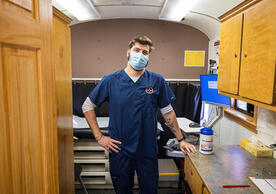
By Jim Shelton
Make way for the vaccine van.
A new “pop-up” clinic makes getting the updated, bivalent COVID-19 booster shot even more convenient by bringing health-giving vaccines to the heart of campus.
The pilot program, a collaboration of Yale Health, Being Well at Yale, and Yale School of Medicine’s Community Health Care Van (CHCV), held its first pop-up clinic Nov. 3 on Cross Campus, outside of Sterling Memorial Library. Health care practitioners vaccinated more than 250 students and staff on a first-come, first-served basis during the day. No appointments were necessary; participants signed up to get their vaccine booster on-site after a brief registration process.
“We’re outdoors, we have a huge student turnout, and we’re making it easier for people to access the vaccine. Bringing the vaccine to the people is the key,” said Nanci Fortgang, chief clinical operations officer for Yale Health and director of the Yale COVID-19 Vaccine Program. “It is very exciting today to see the uptake and interest from our students.”
A second clinic is set for 11 a.m. to 3 p.m. Nov. 10, also at Cross Campus. The event is open to everyone, whether affiliated with Yale or not, although the clinic’s main goal is to boost vaccination among students.
In October, Yale made the decision to require all undergraduate, graduate, and professional school students to receive an updated, bivalent COVID-19 vaccine booster by the start of the spring semester. The university’s primary site for administering vaccines is located on Winchester Avenue.
“By bringing the vaccine to a place where students are all together, on campus, we’re removing one of the barriers to access to the vaccine,” said Amy Rivers, a senior clinical manager at Yale Health.
CHCV is a 40-foot, mobile medical clinic, created by Dr. Frederick Altice of the Yale AIDS Program to overcome traditional medical care barriers by linking patients to medical and social services.
In April 2020, CHCV repurposed its activities to assist with combating the COVID-19 epidemic. The mobile clinic has distributed thousands of masks and sanitizers and completed more than 1,000 vaccinations throughout New Haven neighborhoods. Additionally, CHCV provides medical visits for postpartum mothers and their infants.
And now it’s bringing vaccines to campus.
“CHCV is known for serving the most socially marginalized and medically vulnerable members of the New Haven community,” said Dr. Leslie Sude, associate professor of clinical pediatrics at Yale School of Medicine and director of the CHCV Maternal Child Health Program. “Lately, we have been thinking of New Haven as a whole, including Yale, as our patient. By protecting these students, we’re helping protect all of New Haven and stopping the virus in its tracks.”
At the Nov. 3 clinic, more than 50 students were in line for the vaccine within the first hour. There were registration tables outside of the van, where students checked-in and, to administer the vaccines, six nursing stations — three inside the van and three outside. Inside the van, an additional nurse drew up and labeled vaccines.
“It’s all about workflow. Our van team is especially good at maneuvering in a space like this,” said Liz Znamierowski ’20 M.S.N., a nurse practitioner at Yale School of Medicine. “This is pretty much one-stop shopping, with the idea of meeting patients where they’re at.”
Michaell Santos, a first year student at Yale College, got his booster shot inside the van. He said he’d had some problems finding time to schedule a visit to get his booster, making the pop-up clinic on campus perfect for him.
“It was very convenient, just a two-minute walk to get my booster,” he said. “This makes it much easier and more accessible.”
Fortgang said as she and her staff get more comfortable with the logistics of arranging a pop-up vaccine clinic, they will likely schedule more CHCV events in the future. “We are enormously grateful to CHCV and the partnership we have developed during the pandemic,” she said. “It is precisely because of these relationships and our mutual goals to vaccinate the entire New Haven community that we were able to come together and offer this mobile clinic.”
This article first appeared in Yale News.
